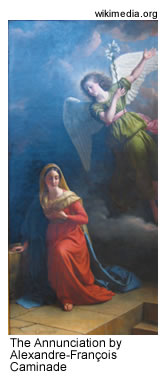by Rev. Jonathan C. Watt
Read Luke 1:26–38.
 Mary was visited by the angel Gabriel. He had good news for her. What words describe the nearness of God to Mary (v. 28)? What two ways does Gabriel say God is with Mary (vv. 28, 30)? What is Mary’s reaction to Gabriel?
Mary was visited by the angel Gabriel. He had good news for her. What words describe the nearness of God to Mary (v. 28)? What two ways does Gabriel say God is with Mary (vv. 28, 30)? What is Mary’s reaction to Gabriel?
_________________________________________
_________________________________________
Gabriel said Mary was “favored.” She was not chosen by God for this honor because she was special or sinless. Mary was a sinful person just like you and me. She was chosen by God’s grace. Mary reacts to God’s “favor” with faith.
_________________________________________
_________________________________________
That’s just like us. We are brought into God’s family by grace. Read Eph. 5:25–27 and Gal. 3:2–27. How does God do this for us? What is our reaction in faith (Eph. 4:17–32)?
_________________________________________
_________________________________________
God was keeping a promise to be with us (Is. 53; 61:1–3). What does God promise to bring when He comes?
_________________________________________
_________________________________________
God’s people have long waited for God to be with them. The Old Testament patriarch Job is no exception (1:1–2:10). We know Job for the trouble God allowed in Job’s life. Read Job 19. What kind of faith does Job express in the middle of his trouble? What does Job want from God? What does he see as God’s solution?
_________________________________________
_________________________________________
Job speaks of the resurrection of the dead, where he will see his Savior eye to eye, face to face, flesh to flesh (19:25–27). Why is this a comfort for him? For us?
_________________________________________
_________________________________________
In a time of trouble, God sent the prophet Isaiah to Israel’s King Ahaz to give him a sign of hope (Is. 7:10–14). What did Isaiah ask the king to do? What was the king’s reaction? What did God do?
_________________________________________
_________________________________________
The sign of Immanuel is a sign of God’s presence. The name Immanuel means “God with us.” God promised to be with Israel in their time of trouble. The promise also reminds Israel that God was their Savior from sin. God promised to come and take care of their sin Himself.
Sin is our greatest trouble (Rom. 5:12–21). How does St. Paul tell us this problem came into being? Whom does he say is the solution to the problem?
_________________________________________
_________________________________________
God gave the people of Israel a sign of what God-with-us would do and how He would bring forgiveness. They were commanded to sacrifice in the temple for their sin (Heb. 10:1–10). The author of Hebrews says these things are a “shadow of things to come.” How do these sacrifices show us what God promised to come and do for His people?
_________________________________________
_________________________________________
Forgiveness of sins comes to us through Jesus’ suffering and death on the cross. God is with us for forgiveness (Matt. 26:26–28). What special way does our Lord give us to receive this forgiveness?
_________________________________________
_________________________________________
Read Martin Luther’s description of the Lord’s Supper in the Small Catechism. Our Savior is with us in, with, and under the bread and wine of the Lord’s Supper. We have the forgiveness of sins through faith. We react in faith. In Phil. 2:1–11, how does St. Paul describe our reaction in faith?
_________________________________________
_________________________________________
Jesus says because He is with us, our relationships are different, too (Matt. 18:15–20). How does Jesus say we should deal with each other?
_________________________________________
_________________________________________


